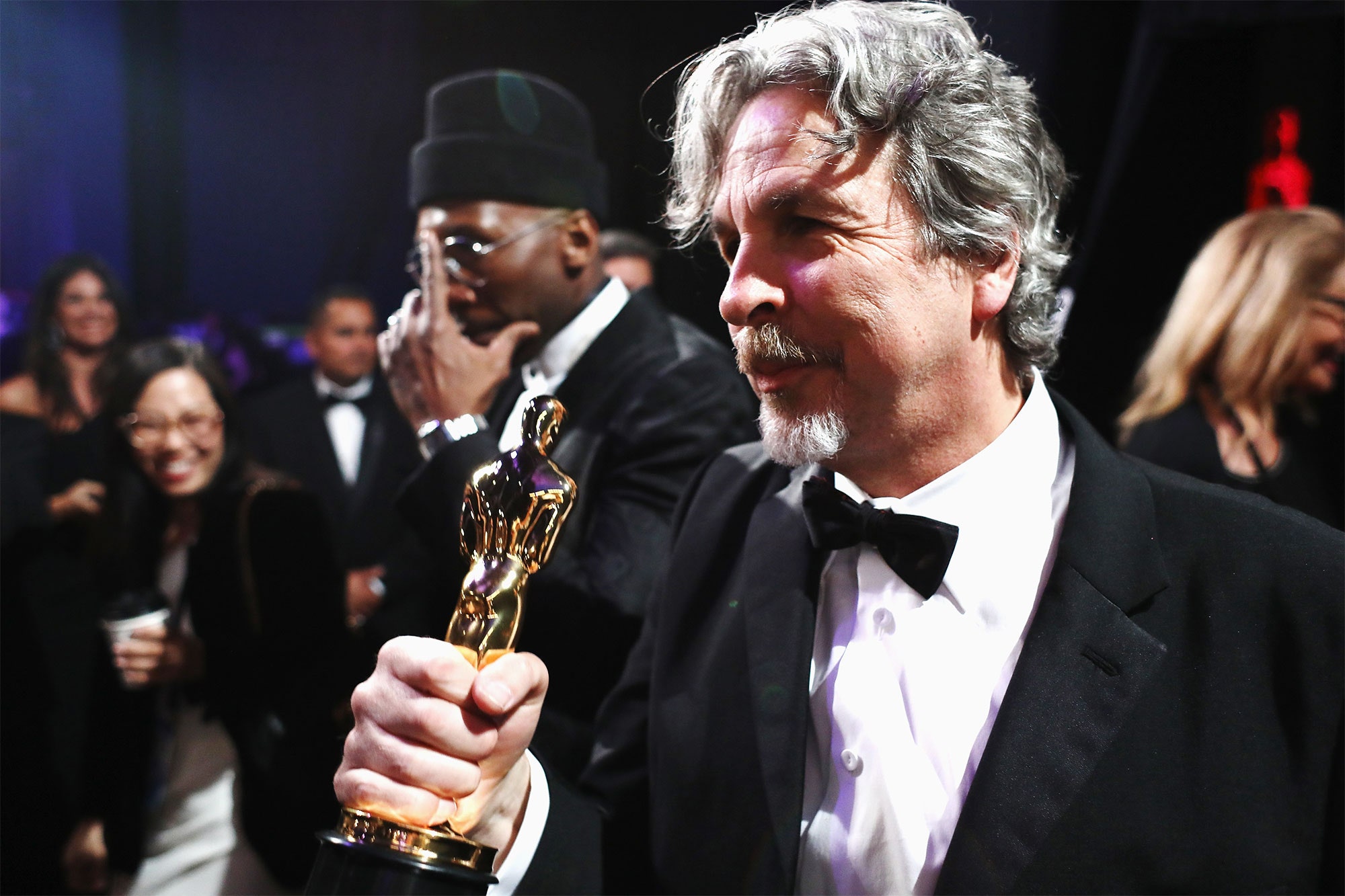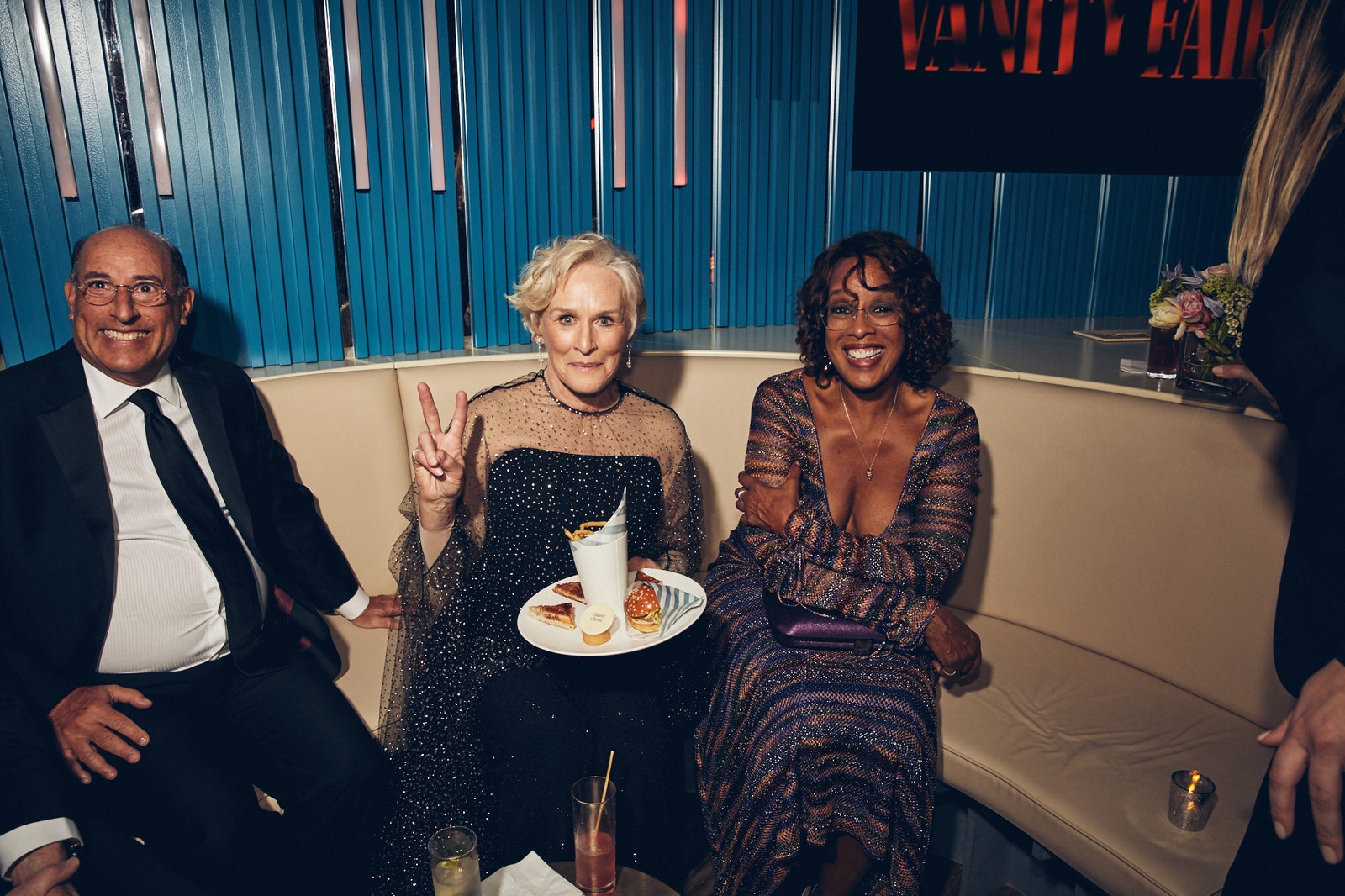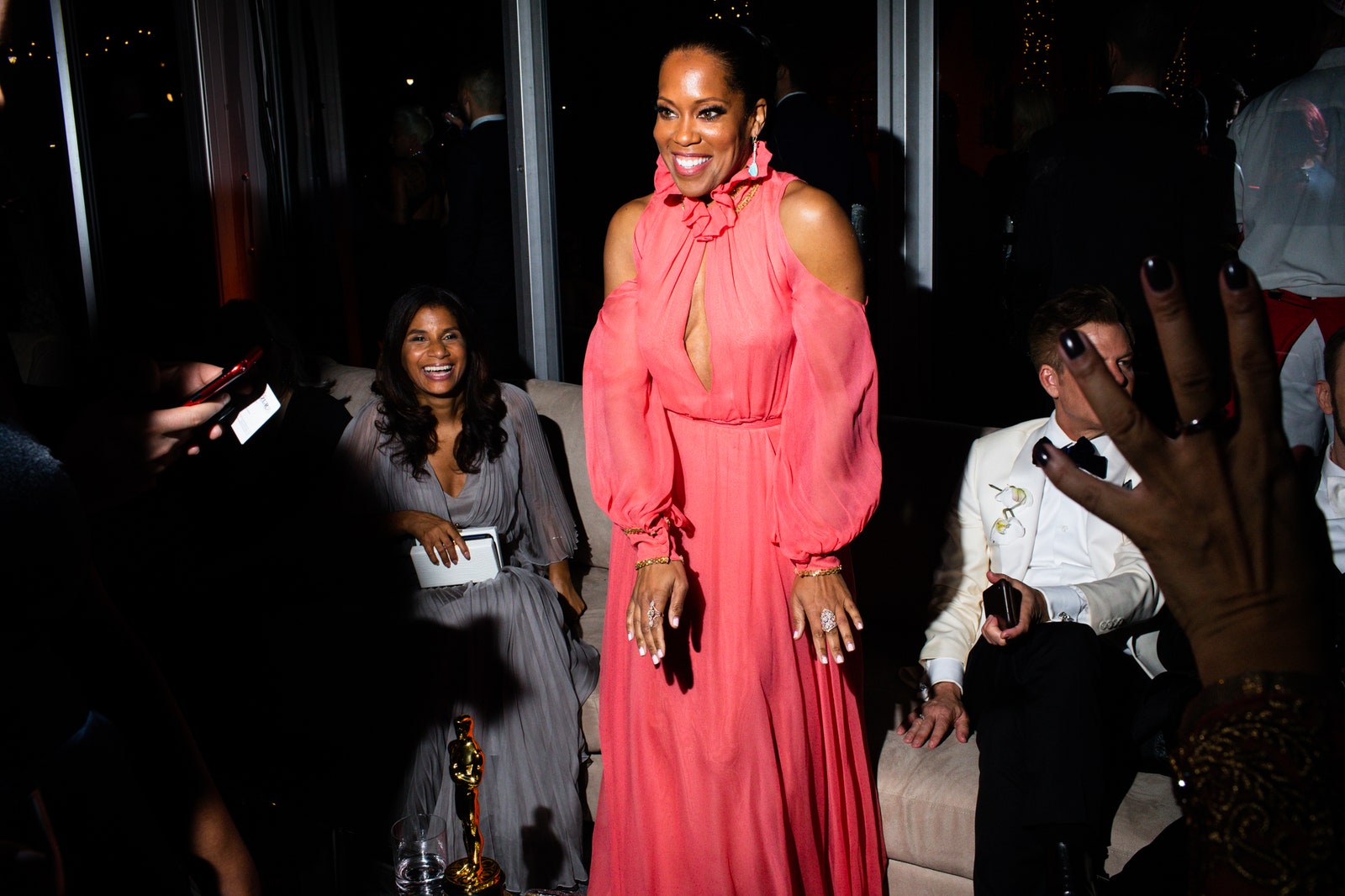I guess we should have expected things to go downhill after the 91st Academy Awards’ opening hour—when eight of the first ten awards presented were spread between four films about people of color: If Beale Street Could Talk, Roma, Black Panther, and Bohemian Rhapsody, with the Parsi Freddie Mercury, played by newly anointed best actor winner Rami Malek, at its center.
But things didn’t go downhill at this year’s Oscars that fast. The hits kept coming from there: Mahershala Ali for his turn as the pianist Dr. Don Shirley in Green Book, Spiderman: Into the Spiderverse—centered on the young Afro-latino superhero Miles Morales, a new generation of Spiderman—for best animated feature; an animated short winner by a Chinese-Canadian woman (“Bao”); a documentary short winner about menstrual equality in India (Period. End of Sentence).
It was a night that saw a production from Mexico win best foreign film for the first time ever—for Roma, starring the Mixtec actress Yalitza Aparicio, the first indigenous woman to be nominated for best actress. That same movie made Alfonso Cuarón the second Mexican director in the last ten years to win his second best director trophy—a win that gave the director a chance to shout out the 70 million domestic workers of the world. “As artists, it is our job to look where others don’t,” said Cuarón, accepting his award.
Sunday night saw Ruth Carter and Hannah Beachler become the first black women to win in their respective categories of best costume design and best production design; they are two of only three black women in the history of the Oscars to win for categories other than acting. And it was the night that finally saw the great American auteur Spike Lee win his first competitive Academy Award. The fifth time was the charm.
I’m guessing, though, that we’ll mostly remember Sunday as the night when despite not having anywhere near the most nominations, or a best director nod, or the momentum of some of its competitors, Peter Farrelly’s warm, fuzzy, and somewhat controversy-ridden Green Book beat what seemed to be diminishing odds to take the top trophy. Is it fair to the other winners that this is how history will be written? Well, history isn’t fair.
And maybe we should have seen this win coming, somewhere around the time of perhaps the night’s biggest bit of irony: when Lee’s BlacKkKlansman and Farrelly’s Green Book—films that feel representative of two ideologically opposite strands of black representation in Hollywood—won back-to-back Oscars for adapted and original screenplay. “Let’s do the right thing!” said Lee, nodding to his criminally snubbed 1989 film. “You know I had to get that in there.” For Lee, the award couldn’t have felt more like a culmination of his career—though, technically, the Governors Award he received from the Academy in 2015 ought to have taken care of that.
Something about those two wins in particular feels too neatly representative of the Oscars as a whole, an institution that feels caught between old and new ways of thinking about movies and the culture that they’re born into. It’s always tempting to narrativize the cultural meaning of the best-picture winner, to say nothing of the sum of the accomplishments and breakthroughs advanced in every other category. I do it; everyone who treats the Oscars like the Super Bowl of entertainment does it. It’s part of the pageant. What can be said about the Oscars this year—what made the show valuable, even for someone like me, who verges on cynical—is that one way or another, the winner was going to seem to “mean” something.
One Academy member in his 50s told The New York Times that he was tired of being told what movies to like. How's that for meaning? Given the size and diversity of the Academy, I’m sure that voter wasn’t alone. Still, I suspect Green Book’s win last night had at least something to do with the vagaries of the preferential ballot system—which is designed such that the “least disliked” film, rather than the most popular one, can take the trophy. I suspect we can thank this for Green Book as best picture, more so than outright support among voters. This is a field that stretched from two crowd-pleasing musicals to a winking political farce about recent American history to a politically savvy black superhero movie, a foreign-language art-house film released by a streaming service, and one of the first major films to tackle the bigotry of the Trump era. There was truly something for almost every stripe of Oscar voter, save, probably, those with a taste for outright melodramas (unless the weepy ending of Green Book, which was cribbed from the ending of the superior 1987 comedy Planes, Trains and Automobiles, qualifies).
Frankly, under the preferential ballot system, it’s more surprising to me that a film like 2016’s winner Moonlight—which is outré by every Oscar standard that I can think of, from its cinematographic style to its subject matter to the composition of its cast—didn’t prove more alienating. That is, to me, what best picture designates under this system: it is the least alienating film of the lot. Green Book, Spotlight, and other similar winners, with their straightforward dramatic arcs, calmly adult subject matter, and unobtrusive but competent style, have the right pedigrees to win this distinction.
I’m not sure it makes sense to be bothered when films like this win, because mediocrity proves victorious every day of the week, in every arena imaginable—and because loving films like Black Panther and Beale Street and Can You Ever Forgive Me? and Roma is much more worth our energy. That doesn’t make me care any less about Green Book's victory, mind you. I’d love for more of us, rather than primarily the subset of the black viewers who are rightly wary of films like this, to feel alienated by Green Book and its ilk, and to want better from movies.
And I’d love for more people to look beyond the gatekeeper-status validation of the Oscars, to know there were better movies in 2018 than Green Book—better ones about racial reconciliation, even, as any Widows fan will tell you. Green Book is a boring movie with a compatibly boring worldview. The irony of it beating actual films by black filmmakers with far more nuanced, fraught, reflective takes on race (one of which—Barry Jenkins’s If Beale Street Could Talk—wasn’t even nominated in the best picture category) is not really so ironic in the context of the Oscars. Just ask Lee, who noted backstage after Green Book won: “Every time somebody’s driving somebody, I lose.” He was nodding to the time his not-nominated Do the Right Thing implicitly lost best picture to Driving Miss Daisy. Green Book is already being hailed as one of the worst best-picture winners ever—replacing Paul Haggis’s Crash on some scales.
Accepting the Oscars means accepting its contradictions. It means accepting that breakthroughs and ostensible setbacks aren't in conflict, in this context, but are both key to the lumbering forward-yet-backwards progress that's always defined the whole ordeal. I think that by treating Green Book like some abnormally bad best picture winner, we undermine one of the strongest arguments in its disfavor, which is that it's so exemplary: of Hollywood cultural values, of white filmmaking about race, and so much else. Ascribing superlatives to the film, even negative ones, makes it seem exceptional. But it isn't exceptional: it's typical. Shouldn't that be the point?
When I finally saw Green Book last fall, I didn't expect, months later, to still be talking about it. I knew it’d make a nice chunk of money (and it did). I figured its actors would get attention (and they did). I guessed, beyond that, that we'd very quickly move on, and watch better, more challenging, rigorous, excitingly written, handsomely made movies—by filmmakers of every race—and not waste too much breath on this lightweight misfire. That last part didn't bear out. But I bet the rest will.
And I bet, with time, we'll all grow to be a bit more bothered by Bohemian Rhapsody winning any trophy than by Green Book (which is a better movie!) winning the top prize. I think—rather, I hope—we come to see this mealy-mouthed, misguided biopic as a bigger embarrassment than the dopey buddy comedy with the bad fried chicken scene. At the Oscars, multiple winners from Bohemian Rhapsody—including Malek—couldn't even bear to name the director of their movie in their tearful thank you's.
Bryan Singer, who’s been fighting off allegations of sexual misconduct for years, and who was removed from this production with only a couple weeks left of filming—allegedly because of clashes with Malek and absences from set, which Singer blamed on his care for a sick family member—has loomed over this film the way Harvey Weinstein looms over every single one of his productions. (Singer, like Weinstein, has denied all allegations of sexual misconduct.) Yet in 2019, Hollywood knows better than to dole out trophies to men whose alleged victims were predominately women and—more importantly—people in Hollywood, names and faces among the Academy’s peers. Singer’s accusers, however, have no such visibility. They aren’t actors we love; they don’t have the likes of Brad Pitt threatening to come to their rescue. And last night, that lack of visibility came with a clear price.
The night was notable for its omissions, for the people and alleged abuses left unacknowledged on a stage that, only a year before, was home to rallying cries against sexual abuse and calls for industry-wide diligence to that end. Malek won for playing Freddie Mercury, a rock icon who, despite the shortcuts taken by the movie, lived a full queer life that amounted to more than the rampant sex that that resulted in HIV or the one monogamous relationship that anchored him later in life; Malek, accepting his trophy, made no such mention of the disease, nor of the millions of gay men, in particular, who perished from it in the 1980s, Mercury among them.
Malek, a straight actor in a gay role, a living actor in the role of a man who no longer has control over his image or legacy, owes quite a bit to that history—even if, in my eyes, his performance did it no favors. Not to acknowledge it is unduly meaningful, as bouts of historical and political amnesia go. It spells out, for the queer people in the audience, what really mattered to this production—or, rather, what didn't.
It's just as meaningful that, when accepting their award for best picture, the director and producers of Green Book made no mention of the family of Don Shirley, a central character in the film—whose legacy, for many people, will be entirely bound up in this movie, and will thus be bound up in what his own relatives have called a flawed, incomplete, unreliable impression. Also missing was any mention of The Negro Motorist Green-Book itself, the black road guide developed in the '60s to keep black motorists abreast of safe motels and eateries in the post-Jim Crow South. The Green Book was essential enough to lend the movie a catchy title and clever premise but not, I take it, at the top of mind for the white filmmakers who barely even made use of this remarkable document in a movie named after it.
Still, I believe Green Book will prove to be one of the best-picture winners we sort of forget about, rather than one we stew over for years and years—more The King’s Speech than Crash. What makes it seem especially offensive is that it feels so retrograde at a time when the Academy’s diversifying, modernizing image should know better. Then again: have you seen The Greatest Show on Earth? There are bigger atrocities than Green Book in the Academy’s closet, I promise you. This was merely a win with a straightforward lesson: we can tell the Academy how to think, even how to feel. We can hold it to the high standards of the art form it ostensibly honors. But we cannot tell it what to do. Lesson learned.
— Check here for our comprehensive coverage
— See the full list of Oscar winners
— See the best-dressed stars on the red carpet
— The quick, hostless opening riff
— Lady Gaga dazzles with a rare Tiffany diamond




